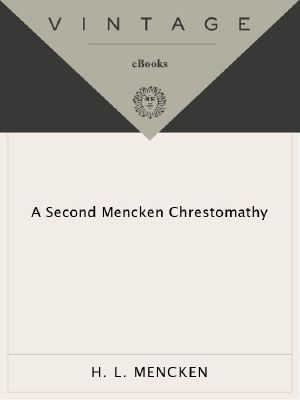Second Mencken Chrestomathy

This Wonderful Sequel to the best-selling A Mencken Chrestomathy of nearly half a century ago is full of the iconoclastic common sense that marked H. L. Mencken's astonishing career as the premier American social critic of the twentieth century. Gathered by Mencken himself before he died in 1956, this second chrestomathy ("a collection of selected literary passages," with the accent on the tom) contains writings about a variety of subjects - politics, war, music, literature, men and women, lawyers, brethren of the cloth. Some of his essays have beguiling titles - "Notes for an Honest Autobiography," "The Commonwealth of Morons," "Le Vice Anglais," "Acres of Babble," "Hooch for the Artist." All of them are a pleasure to read, and we are reminded that what Mencken wrote in the early years of this century remains applicable to a very different America.
Publishers Weekly - Publisher's Weekly
This book's precursor, A Mencken Chrestomathy (collection), was a bestseller in 1949; this anthology of 238 short excerpts from a range of works, selected and annotated by Mencken but unfinished, lay undisturbed in a Baltimore library until Teachout, an arts columnist for the New York Daily News, found it in 1992, while working on a Mencken biography. Teachout considers Mencken's work still immediate. Indeed, quotable lines abound: His public life is an endless series of evasions and false pretenses,'' writes Mencken onthe politician under democracy.'' Baltimore's bard can be magnificent and maddening in the same passage, damning American idiocies while disparaging immigrants. But what impresses most about this collection is Mencken's breadth; few contemporary writers would assume such a broad brief, writing not only about politics, law and the clergy but also about geography, literature, music and drink. To apply a Mencken sobriquet, he was no lesser eminento. (Jan.)
Library Journal
Selected as a continuation of the original chrestomathy by the Baltimore iconoclast himself before his death, this logically organized sampling of his pre-Depression credos (mostly from The Smart Set and American Mercury) suggests why Mencken was to a whole generation of American youth not just a witty newspaperman with a dazzling style but a force gleefully battering America's deep-rooted Puritan inhibitions. An early champion of Sinclair Lewis, Eugene O'Neill, and Theodore Dreiser, Mencken ridiculed America's institutions, from Rotary Clubs to Harvard professors to the Senate. Sometimes wrongheaded in his judgments, he was unschooled but self-educated in music and politics. His views are sometimes racist and sexist, but they're seldom dull and-in an age of self-conscious "niceness"-never polite. Well worth dipping into.-Charles C. Nash, Cottey Coll., Nevada, Mo.
Gilbert Taylor
Following My Life as Author and Editor" (1993) and Fred Hobson's biography , the Menckenian revival continues apace with this sparkling successor to the first chrestomathy, which was a best-seller in 1949. More than an anthology, the second volume represents pieces (some previously unpublished) that Mencken himself selected and revised before his stroke aborted the project; another proposal to publish came to nought in 1963. Over 60 percent of the 238 items, many from Mencken's magazines Smart Set" and American Mercury", are not available elsewhere, which in itself makes the publication of this title something of a literary event. That it parades again the sage of Baltimore in his incisive, if often irksome, eloquence only confirms him as one of the better belletrists of the century. The job of discriminator of taste exists to be seized in any age, and in the teens and twenties, Mencken extolled and excoriated with idiosyncratic abandon. The books and music he reviewed have faded from memory, but his satirical exfoliations remain fresh, for example, in praise of a bartender's memoir of the bibulous arts or in contempt for a Rotarian's history of his organization. Edited by New York critic Terry Teachout, who is preparing his own biography of the provocateur, this entertaining, exasperating collection captures Mencken's gloomy view of human nature and his bright delight in stripping from it all cant and concealment.